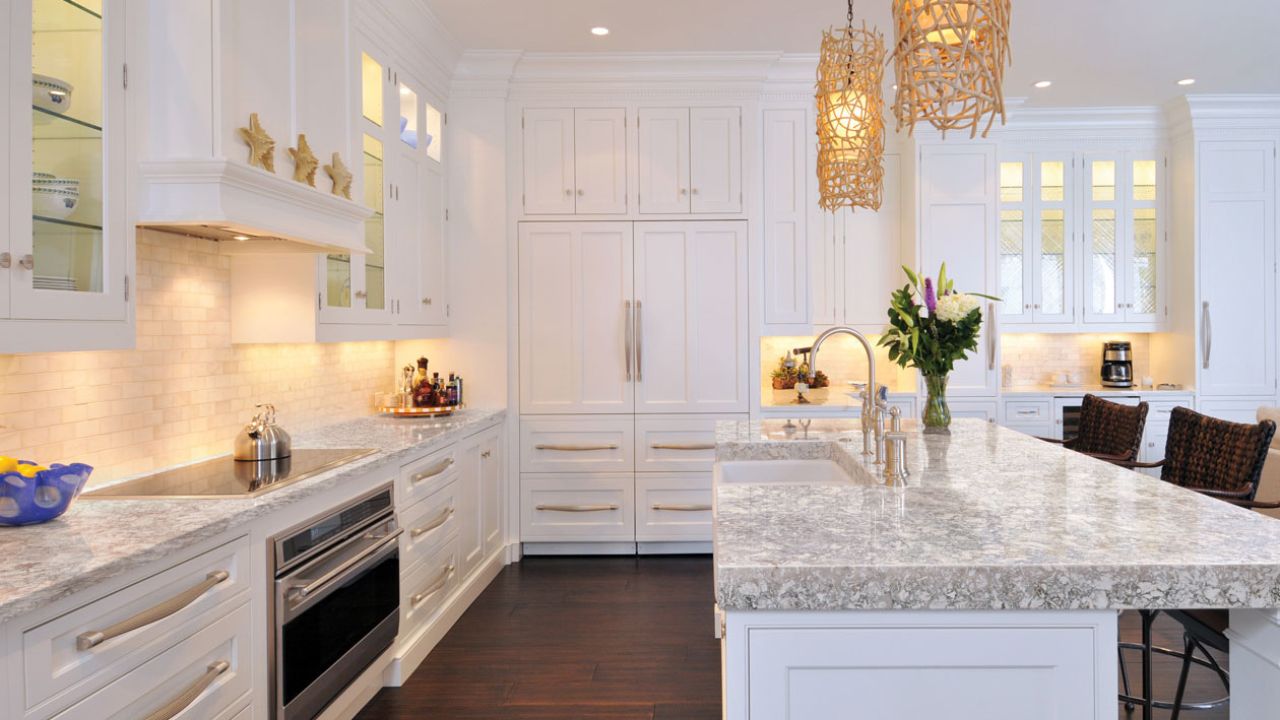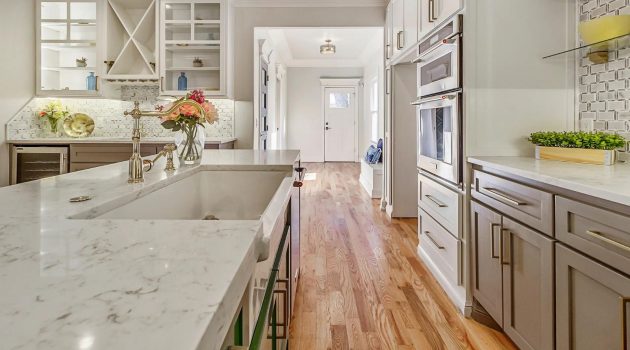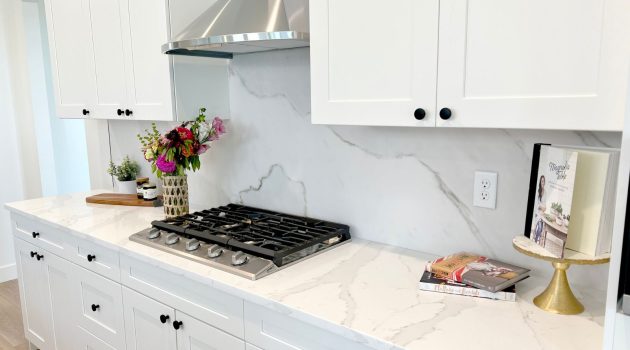Quartz countertops have become increasingly popular as a stylish, durable, and low-maintenance option for kitchens and bathrooms in recent years.
Consider this versatile material for your home, and with good reason. Thanks to their synthetic nature, quartz countertops offer a wide range of colors and patterns, which allows for nearly limitless design options.
However, as with any decision about your home, it’s essential to understand the pros and cons of quartz countertops to make an informed choice.
In this article, we’ll explore the advantages and drawbacks of this attractive material to help guide you in making the best decision for your kitchen or bathroom.
1. Pros of Quartz Countertops
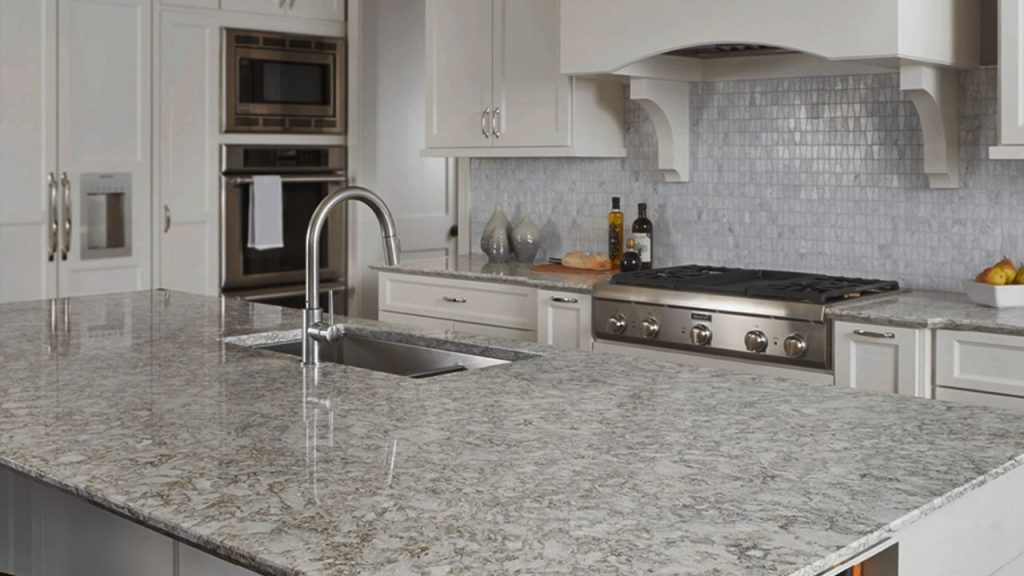
Quartz countertops are popular for many homeowners due to their numerous advantages.
Made from engineered stone, these countertops offer a wide range of benefits worth considering for your kitchen or bathroom.
One of the most significant pros of quartz countertops is their stain-resistant nature.
Since they are non-porous, they don’t absorb liquids and resist stains from common household items like coffee, tea, and wine.
This makes them ideal for kitchens, where spills and accidents are more likely to happen.
Quartz countertops are also low maintenance.
Unlike natural stone countertops requiring regular sealing and upkeep, quartz countertops only need a simple, regular cleaning routine with mild soap and water.
With their nonporous surface, bacteria, and germs have a hard time finding a place to thrive, giving your countertop a more sanitary quality.
These countertops offer a wide variety of colors and patterns to choose from. Whether you prefer a simple, uniform color or the look of natural stone, there is a quartz countertop to suit your taste.
The consistent appearance of quartz helps create an elegant and visually appealing space in your home.
The unique, engineered nature of quartz countertops allows for a more consistent pattern and color distribution across the entire surface.
This means your countertops will have a more uniform appearance, which some may find more visually appealing than the random patterns found in natural stone countertops.
2. Cons of Quartz Countertops
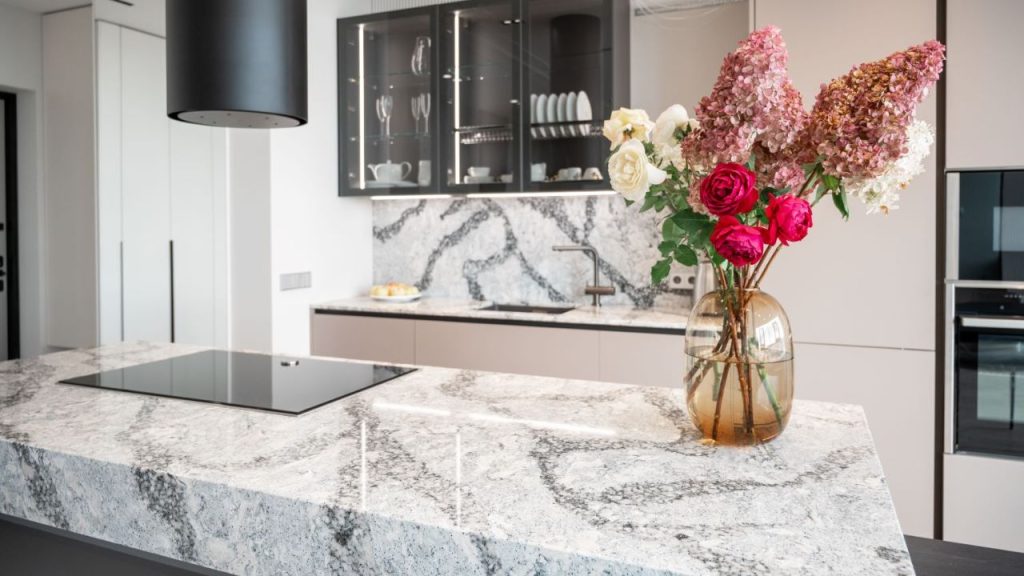
While quartz countertops boast numerous benefits, it’s essential to be aware of the potential drawbacks before making a decision.
Here are some cons to consider when choosing quartz countertops for your home:
Expense
Quartz countertops can be expensive, as they typically cost more than other countertop materials like laminate or solid surface options.
The price range may vary, but remember that high-quality quartz usually comes with a higher price tag, so it might not be the best option if you’re on a tight budget.
Visible Seams
As quartz slabs are manufactured, you may notice visible seams, especially in larger countertop installations or areas with curved sections.
While fabricators do their best to minimize the appearance of seams, they may still be noticeable, which detracts from the overall look you’re going for.
Potential for Cracks and Chips
Quartz countertops are quite durable, but they’re not indestructible. They can still crack or chip under extreme pressure, especially on the corners or edges.
Be cautious when handling heavy objects around your countertops to avoid damaging them.
Discoloration
Prolonged exposure to direct sunlight may cause discoloration in quartz countertops over time. This applies particularly to your countertops near large windows or patio doors.
Choosing quartz for an outdoor kitchen may not be the best option due to potential discoloration.
Indoor Use Only
While quartz is a beautiful and functional choice for indoor countertops, they are not recommended for outdoor use.
As mentioned earlier, exposure to sunlight may cause discoloration issues, and fluctuating temperatures may also cause potential damage.
Heat Damage
While quartz countertops are generally heat-resistant, prolonged exposure to high temperatures (above 300°F) may cause damage.
It’s recommended to use trivets, hot pads, or any barrier between your countertop and hot pots or pans to avoid heat damage.
Weight
Quartz countertops weigh around 20-30 pounds per square foot. Your cabinets and supports should be strong enough to handle the added weight.
Check with your cabinet manufacturer or installer to ensure that the cabinets can support the weight of quartz countertops.
Considering these cons and weighing them against the pros, you can make a more informed decision when choosing quartz countertops for your home renovation project.
3. Comparison with Other Countertop Materials
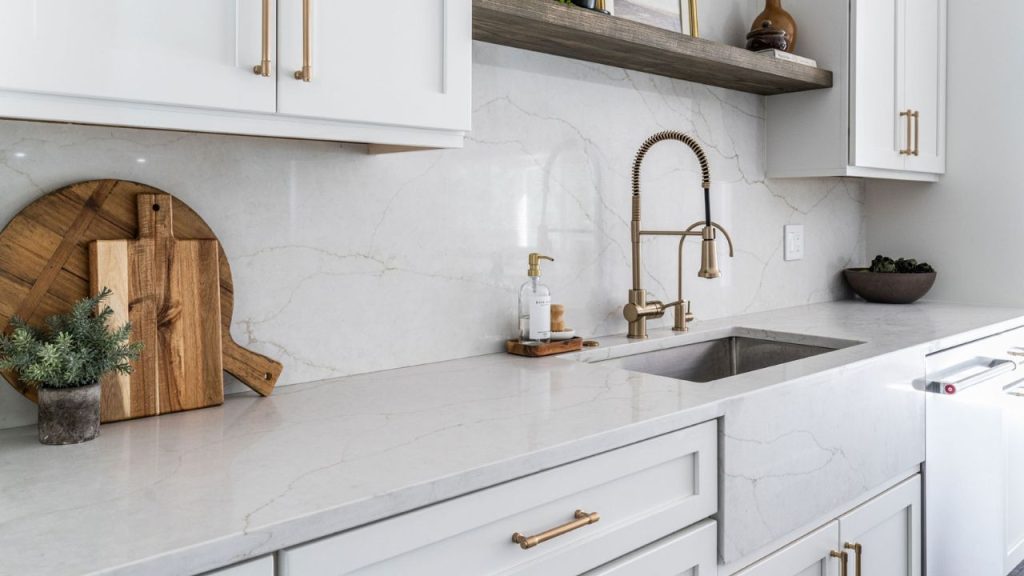
Quartz Countertops vs. Quartzite
Quartz and quartzite countertops are often confused due to their similar names but distinct differences.
Quartz countertops are engineered from natural quartz crystals combined with resin, while quartzite is a natural stone formed from sandstone and quartz under high heat and pressure.
- Quartz: Non-porous, low maintenance, scratch, and stain-resistant, and available in various color options.
- Quartzite: Porous (requires sealing), higher maintenance, heat resistant, and limited in color options.
Quartz Countertops vs Granite
Both quartz and granite are high-end countertop materials, but they have different attributes:
- Quartz: Non-porous, consistent color and pattern, and no sealing required.
- Granite: Porous (needs sealing), natural variation in color and pattern, somewhat heat resistant, and prone to chipping.
Butcher Block vs Quartz
Butcher block countertops are made of wood, giving them a warm, natural appearance compared to the engineered look of quartz.
- Quartz: Durable, low maintenance, and available in various colors and patterns.
- Butcher Block: Requires regular maintenance (oiling and sanding), prone to scratching and staining, and not suitable for wet areas.
Quartz vs Marble
Marble countertops are natural stone countertops known for their luxurious appearance. However, they have different properties compared to quartz countertops:
- Quartz: Non-porous, scratch and stain-resistant, low maintenance, and no sealing required.
- Marble: Porous (needs sealing), prone to scratches and staining, high maintenance, and sensitive to acidic substances.
Silestone vs Quartz
Silestone is a brand of engineered quartz countertops, so the comparison between Silestone and quartz is more about brand preference and not material differences.
Some key points to consider:
- Silestone: Offers a 25-year warranty, available in over 90 colors, and has built-in antimicrobial protection.
- Quartz (other brands): Warranty varies, color and pattern options depend on the specific brand, and antimicrobial properties depend on the resin used.
Quartz vs. Porcelain Countertops
Porcelain countertops are made from dense ceramic and are becoming increasingly popular due to their durability and design versatility.
- Quartz: Non-porous, scratch and stain-resistant, low maintenance, and various colors and patterns.
- Porcelain: Heat-resistant, stain-resistant, UV-resistant (for outdoor use), and available in various styles, but it requires professional installation due to the material’s fragility.
As you consider these comparisons, keep in mind your personal preferences, budget, and the unique requirements of your space so you can select the countertop material that best suits your needs.
4. Quartz Countertop Buying Guide
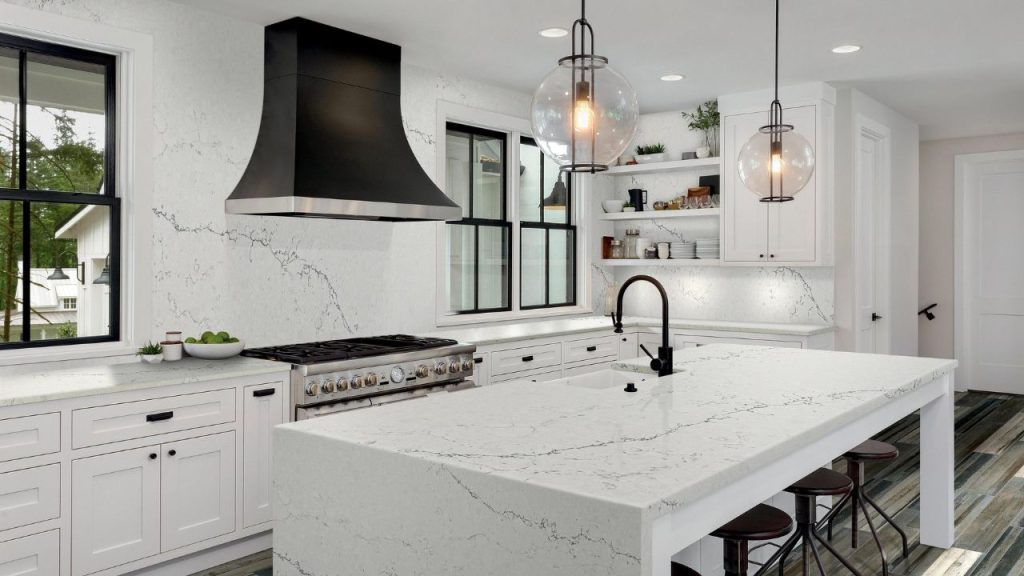
When choosing the perfect quartz countertop for your home, several factors must be considered. Here is a friendly guide to help you navigate the process.
Top Brands
Start by exploring the top brands of quartz countertops. Some well-known manufacturers include Cambria, Caesarstone, and Silestone.
These companies offer various design options and have a reputation for producing high-quality products.
Slabs
Quartz countertops are made from natural quartz and synthetic materials. The manufacturing process uses patented technology developed by the Italian company Breton.
The resulting slabs are incredibly durable, nonporous, and low maintenance. To choose your ideal color and pattern, visit a local showroom to see and feel the different slabs in person.
Warranty
A big advantage of investing in quartz countertops is that they come with warranty options. Reputable manufacturers, such as Cambria, Caesarstone, and Silestone, offer warranties on their products.
Though the terms and conditions may vary, these warranties typically cover defects in manufacturing and materials for an extended period.
Ensure you read the warranty terms before finalizing your purchase.
Factors to Consider
Keep the following points in mind while shopping for quartz countertops:
- Color and Design Options: Quartz countertops offer an extensive range of colors and patterns, allowing you to find the perfect match for your kitchen or bathroom.
- Durability: Quartz is known for its exceptional durability and resistance to stains, scratches, and heat.
- Maintenance: These countertops require minimal maintenance, as they don’t need sealing like natural stone counterparts. Regular cleaning with mild soap and water will keep your quartz countertops looking pristine.
- Price: Quartz countertops can be more expensive than other materials like laminate or solid surfaces. However, their durability, warranty, and low maintenance make it a valuable investment for many homeowners.
By considering the top brands, exploring different slab designs, understanding warranties, and weighing the pros and cons, you can confidently choose the perfect quartz countertop for your home.
Happy shopping!
Frequently Asked Questions
What are the maintenance requirements for quartz countertops?
Quartz countertops are known for their low maintenance requirements. They are nonporous and do not require sealing, making them ideal for kitchens and bathrooms. Clean them with a damp cloth and mild detergent for daily use. Avoid using abrasive cleaners or scrubbers, as they can damage the surface.
How do quartz countertops compare in durability with other materials?
Quartz countertops are highly durable, thanks to their man-made composition of natural quartz and minerals. They are resistant to scratches and chips and are less likely to crack or break compared to natural stones like granite or marble. They are factory-made composites with fewer defects and a homogeneous appearance, ensuring their overall strength and longevity.
Can quartz countertops withstand heat and stains?
Quartz countertops are resistant to staining, as their nonporous surface prevents liquids, oils, and other substances from penetrating the material. However, they are not as heat-resistant as natural stones like granite, so it is important to use heat protectors or trivets when placing hot pots or pans on the countertop to prevent potential damage.
What is the typical price range for quartz countertops?
On average, quartz countertops can range from $15 to $70 per square foot. It’s worth noting that this can vary depending on the manufacturer, quality, and style of the countertop. On the lower end, laminate countertops cost between $8 to $27 per square foot, while natural stones like granite and marble can range from $15 to $140 and $15 to $190 per square foot, respectively.
What variety of colors and styles are available in quartz countertops?
Quartz countertops offer various colors and styles, thanks to the various pigments and resins used in their manufacturing process. You can find options that mimic the appearance of natural stones’ appearance and unique, modern designs. Quartz countertops are available in various patterns, from solid, uniform colors to a mix of veins and speckles.
How does the installation process of quartz countertops compare to other materials?
The installation process of quartz countertops is similar to other countertop materials. Professional installation is recommended to ensure a proper fit and avoid potential damages. However, as quartz is a heavy material, additional support may be needed for your cabinetry, and transportation and handling can be more challenging compared to lighter materials, such as laminate or wood.
